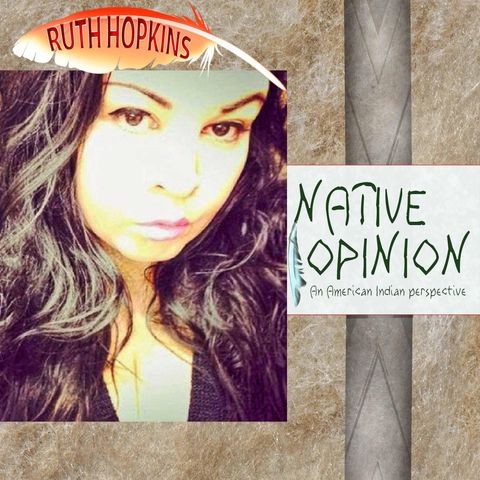Explicit
Episode 21 Hemp vs Pot

Apr 10, 2016 ·
1h 53m 43s
HEMP VS POT? Tribes are considering starting crops for both Medical Marijuana, and Indian hemp. But should they? On this episode of Native Opinion, we discuss these issues and more!...
show more
HEMP VS POT? Tribes are considering starting crops for both Medical Marijuana, and Indian hemp. But should they? On this episode of Native Opinion, we discuss these issues and more! Discussion points with our guest, Ruth Hopkins: 1.) Excerpt: "Pot and Pretendians" Author: Ruth Hopkins Recently, officers in Sonoma County, California, confiscated marijuana plants from the Oklevueha Native American Church. Members of the church say the plants are sacred and used ceremonially. They’ve since taken the matter to Federal Court, suing Sonoma County, its Sheriff, and the Governor of California, claiming they’ve been discriminated against under the Constitution of the state of California, and alleging rights violations under the American Indian Religious Freedom Act. The members assert that marijuana is integral to their sacraments, just like peyote. There’s just one problem. It’s not. While I’m not a member of the Native American Church, I practice Dakota/Lakota spirituality, and marijuana has not, nor has it ever been, used as a part of ceremony. Claiming its part of our spirituality to avoid catching a case threatens the rights of actual Natives who deserve protection under the American Indian Religious Freedom Act. Yes, I said ‘actual Natives.’ You see, the Oklevueha Native American Church, established in April 1997 in Gunnison, Utah, doesn’t appear legitimate. There is an old black and white hemp propaganda film which was released in 1942 called “Hemp for Victory”. I say propaganda because it was one of those old war time films. It really offers an insight into how we were and (arguably) are controlled by our government through ridiculous regulation, and as native people its even worse. It has always been our sovereign right to grow and harvest Hemp. There is a part in this firm directing farmers to register to be allowed hemp growers is interesting because in the film, the show a copy of the registration. Back then it was called a “Special Tax Stamp”. They were issued for one dollar. And in bold print is stated “Producer of Marihuana”. [Play Hemp for Victory] "What is the difference between Hemp and Marijuana? A.) Genetics Cannabis is believed to be one of the oldest domesticated crops. Throughout history, humans have grown different varieties of cannabis for industrial and medical uses. Other plants were recognized for being psychoactive and were bred selectively for medical and religious purposes. This led to unique varieties of cannabis that we now know as marijuana. B.) THC Content Cannabis plants contain unique compounds called cannabinoids. Current research has revealed over 60 different cannabinoids so far, but THC is the most well known. THC is credited with causing the marijuana high. C.) Cultivation Hemp and marijuana are grown for different uses, and therefore require different growing conditions. Dan Sutton of Tantulus Labs, a Canadian company that specializes in cannabis cultivation technology, states “the core agricultural differences between medical cannabis and hemp are largely in their genetic parentage and cultivation environment.” Article Sources: http://www.leafscience.com/2014/09/16/5-differences-hemp-marijuana/ http://www.medicaljane.com/2015/01/14/the-differences-between-hemp-and-cannabis/ http://indiancountrytodaymedianetwork.com/2015/12/21/pot-and-pretendians https://www.youtube.com/watch?v=NMvvNnRjkOo 2.) Black Hills Sacred Site land in trust Why do the nine tribes constituting the Great Sioux Nation, including those on Pine Ridge, staunchly refuse to accept $1.3 billion from the federal government? The refusal of the money pivots on a feud that dates back to the 1868 Treaty of Fort Laramie, signed by Sioux tribes and Gen. William T. Sherman, that guaranteed the tribes “undisturbed use and occupation” of a swath of land that included the Black Hills, a resource-rich region of western South Dakota. But in 1877, one year after Gen. George Armstrong Custer’s infamous defeat at the hands of Crazy Horse at Little Bighorn and without the consent of “three-fourths of all adult male Indians” stipulated by the treaty, the government seized the Black Hills, along with their gold, and began profiting from the protected land. On November 30th, 2012, Rosebud Sioux Tribal Chairman Cyril “Whitey” Scott, the purchase of the sacred lands in the black ills as a done deal. “I can tell you that Pe' Sla, the sacred land on behalf of the Oceti Sakowin, is secured. The $9 million was secured, Pe' Sla has been purchased.” Additional Article Sources: http://indiancountrytodaymedianetwork.com/2014/06/28/reclaiming-sacred-black-hills http://www.pbs.org/newshour/updates/north_america-july-dec11-blackhills_08-23/ 3.) Should Tribes Trademark Their Names? In the United States, Native American names and symbols appear on many company products. Jeep Cherokee, Pontiac cars, Shawmut Bank, Mohawk Paper Company, Crazy Horse Malt Liquor and Sioux Industries are just a few examples. The federal and state systems of trademark registration can be a powerful way for Native American Nations to register and protect their names - and to stop companies from using their names on products, such as the Jeep Cherokee. trademark law regulates and protects the names and slogans that companies use to sell their products. The names and symbols of indigenous groups may be among the few remaining resources or cultural properties of many indigenous societies. Can the unauthorized use of Native names and symbols be stopped? Source: https://www.culturalsurvival.org/publications/cultural-survival-quarterly/united-states/whats-name-can-native-americans-control-outsi Hour 2: "Birdie Sanders" Bernie Sanders interviewed by Steve Segaris, Senior Political editor CBS news and Kylie Atwood, a CBS news Producer.who cover Bernie Sanders Campaign Nationally. Kylie Asks Bernie if he has a "Spirit Animal" after a bird invaded one of his speeches. #BirdieSander Trended. Mention the audio quality, and why Internet broadcasts get bad name because of 1/2 ass work like this interview with Bernie sanders. "Tribal Self Sufficiency" Chief Clarence Louie of the Osoyoos Indian Band in British Columbia Canada, stated that a tribes success is to be self-sufficient, means to get off the federal dollar.
show less
Information
| Author | Native Opinion Incorporated |
| Website | - |
| Tags |
Copyright 2024 - Spreaker Inc. an iHeartMedia Company
